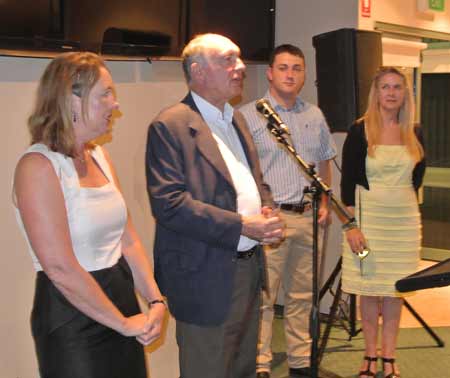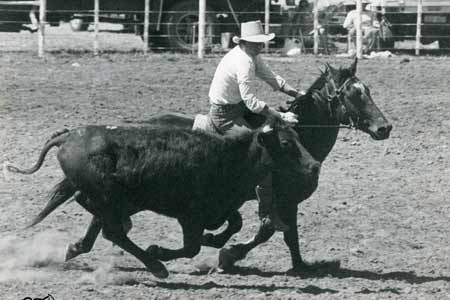Opposite poles: candidates for Lingiari
20 April 2013
 By ERWIN CHLANDA
By ERWIN CHLANDA
“I’d like to thank Warren Snowdon very much for being here tonight.”
With that Daniel Davis, the president of the Alice Springs branch of the Country Liberals, brought the house down at the drinks and nibbles last Thursday evening.
He was meant be thanking quite another Warren, the Nationals Leader Warren Truss.
He had been addressing some 30 party members in support of CLP candidate for Lingiari, Tina MacFarlane.
Mr Davis’ slip of the tongue was entirely understandable: for anyone interested in politics, the name Warren Snowdon has been virtually synonymous for a quarter of a century with the sprawling Northern Territory seat in the Federal Parliament, formerly even including Darwin.
In that time Mr Snowdon has had a role in the spending of many billions of dollars of public money, supposedly on the advancement of Aboriginal people, while they remained mired in the morass of passive welfare.
For hundreds of media calls over the years Mr Snowdon, with trademark Groucho Marx moustache and Akubra, has carefully positioned himself so as to be in the frame of television cameras, behind a string of Ministers announcing money for yet another program.
But the media calls announcing the advancement achieved by these programs were thin on the ground, such as Aboriginal people being in mainstream jobs, running businesses, being self-sufficient, healthy, sober and caring for their families in homes they have built or paid for.
There could be no greater difference between Mr Snowdon and Ms MacFarlane.
Mr Snowdon gave up his career as a teacher in 1983 to became a senior project officer with the Central Land Council (CLC) in Alice Springs.
He was elected to the House of Representatives in July 1987, served till March 1996, and was re-elected in October 1998.
Wikipedia describes him as “a member of the Socialist Left faction of the Australian Labor Party and of the hard left of the faction”.
Ms MacFarlane arrived in the Territory from Central NSW in the ’80s, after completing agricultural studies: “I broke down in Katherine and I was too proud to write home to mum and dad to help me with my car.
“I went out to Innisvale Station and got a job fencing. I knew how to fence. There I was, fencing in the middle of nowhere. Then they were short of someone in the cattle yards, and I’d kind of grown up on a horse and mixed farming property.
“Anyway, I helped in the cattle yard with the stock work and they then wanted me to go out to the bull catching camp, and so I went out bull catching, too.
“As a twenty one year old, the north, the big country, the serenity. It was so exciting.
“When you’re young, you don’t think about working hours. When they were doing chopper yarding and mustering, I worked with them. It was so invigorating and engaging.”
She later worked for a stock and station agent in Katherine, in the tourism industry, local government and now lives in Mataranka where she and her husband, Lindsay, own a 95 square kilometre property, raising stud and commercial cattle and growing produce.
This kind of enterprise is, of course, precisely what many other serious commentators say Aboriginal people could be doing. Given they own half the Territory’s landmass, that’s regarded as a viable transition into the mainstream economy and society. Ms MacFarlane agrees.
It is also precisely what Mr Snowdon and the Central Land Council, to which he has been closely linked during his entire political career, have studiously avoided for decades.
It is an alliance that has reached its use-by date, as Aborigines in droves are turning their backs on Labor.
CLC job creation is limited to the token efforts of Centrefarm. It’s objective, says the website, is “development of viable regional economies on Aboriginal land for the benefit of the Traditional Owners”.
This currently seems to take the form of a handful of enterprises using itinerant labour from interstate to do the work on the ground, instead of drawing on the massive pool of locals who are on the dole, supplied by Canberra, generation after generation, no questions asked.
Ms MacFarlane says it’s the Indigenous elders who should be driving reform but “they have got no authority over the younger generation any more.
“The kids have no incentive to work. They cannot make the kids work out on the communities, there are no real jobs.
“When I was young I didn’t get given a car. I had to work for it. I didn’t get anything because I didn’t have any money.
“We are giving them housing. They trash their house. Three years later they get another one. Why would they work? They get a hundred bucks to go to meetings. What is the inspiration to work?
“We have stripped all that away, and it’s the white man’s policies that have damn well done that.”
This takes us to Centrelink. Would Ms MacFarlane support a scenario where Centrelink says to an unemployed person: There is a bricky who needs a bricky’s labourer. Here is the bricky’s phone number. You now have a job. Congratulations. Your dole has just been stopped.
“I would agree with that and would support it one hundred percent. The only thing I do keep in mind is, if you are the small business person you need to have someone who wants to and is willing to work.
“That’s where we have lost the connection with our Indigenous people.”
Another notable difference between Mr Snowdon, replete with media team and minders, and Ms MacFarlane, doing her own work in this field, is their media policies.
 His are simple: stonewall hard questions. Make a promise to give answers and then break it.
His are simple: stonewall hard questions. Make a promise to give answers and then break it.
Ms MacFarlane says: “I just try to be honest and say how it is.”
She doesn’t hesitate to be outspoken.
“I haven’t had an extensive experience in the media, quite obviously,” she says. “I don’t ever intend to mislead.”
She says she’d like to “speak to every single person”.
People are saying to her, “Gee, we haven’t had someone coming to talk to us”.
It’s all about listening, she says: “
People haven’t been engaged, especially on the Federal level.
“Warren’s been 25 years in Federal politics and, yeah, they just haven’t seen or heard of him for a lot of years.”
She says the most honest encounters between her and her husband (“he’s been out in the bush all his life”) and Aboriginal people are taking place in the mustering camp – the same place where the most fruitful interchanges between the races have historically occurred.
Especially her husband has close relationships with Aboriginal men.
“Out on the station, out in the stock camp, everyone connects, they really connect that old bush way, and they really have that trust.
“They just light up. They say, will you really listen? People go out and say they want to consult. They are not listening. They are not understanding.
“I want engagement. I want things to improve.”
Ms McFarlane thinks agriculture holds the key, at least for the moment, especially rotating “cattle cycles and cropping cycles – you can really help your land.
“It might need irrigation. We need a balance.
“Someone needs to get out there and say, hey, let’s do this together. I think we can drive things together. There is so much happening up here in the north.
“We can’t give up. This is our future, for our kids. We’ve got to have the energy. There is no point saying it’s all too hard.
“There’s good people out there. They want to do it. A lot of the Indigenous want to do it. We’ve just got to be strong together.
“Snowdon’s way is to fuel the fire of welfare dependency.”
Ms MacFarlane also says Lingiari is hugely diverse electorate with many rural, regional and remote constituents, and “it is imperative that I represent the views of the entire electorate and equally importantly the small businesses that are struggling with the hardships and to survive in our regional areas.”
•
PHOTO (at top, from left): Tina MacFarlane, Warren Truss, Daniel Davis and Jenny Lillis. Ms MacFarlane campdrafting in the eighties.



Agriculture holds one method available.
What are the land-owning corporate Land Trusts, their Commonwealth appointed agents the Land Councils, and their own shareholders (aka “Traditional Owners”) investing and developing, agriculture or anything, within their own 750,000 square kilometres of land?
Harvest many camels lately?
Giving money for nothing is rare, now even for politicians giving away public monies.
Others require leases.
Obtaining valid and reasonable leases remain critical for development, employment, and opportunity within these communities.
Without leases who will invest their own money ?
Or is it still snouts in Public Monies troughs ?
Act now, end now, those Commonwealth exemptions these corporate Land Trusts, their agents the Land Councils, hide behind.
End their ignoring their responsibilities as landlords, as agents, towards their tenants – currently denied leases.
End their denial to their tenants the same rights and responsibilities held by tenants with other landlords.
Until this small exemption ceases, expect no substantive change happens, and talk to produce little change.
The talk is meaningless except to racists arguing our rights and responsibilities must be qualified by racist measurements.
The Truss gaffe is almost as funny as the attempt by the leader in waiting and his spin ie cover up attempt on the cut his throat comment!
Wow, Tina, way to foster hate and division in the community: by the way you like to sink the boot in a fella while he’s down, I think you have long career in parliament ahead of you.
Just a word of advice: spend a bit more energy on the groin area. The head’s just for show, once you’ve made those marks, kick em where it really hurts.
Love and Kisses.